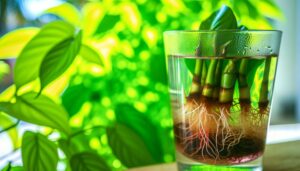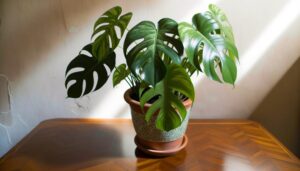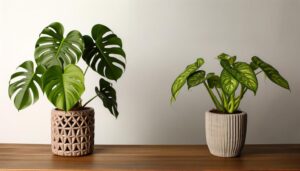Are Monstera Albo Seeds Real? Discover the Truth!
Genuine Monstera Albo seeds are incredibly rare and often don’t reliably yield the desired variegation. Experts suggest that the variegation, which results from a genetic mutation, tends to be unpredictable and unstable when propagated through seeds.
Most authentic seeds come with certificates from reputable institutions. More reliable propagation methods include stem cuttings and air layering, which are more effective in preserving the variegation traits.
If you’re exploring the characteristics and challenges of genuine Monstera Albo seeds, understanding the propagation methods and their success rates will be beneficial.

Key Takeaways
- Genuine Monstera Albo seeds are extremely rare and hard to find.
- Verify the credibility of the source when purchasing Monstera Albo seeds.
- The variegation from Monstera Albo seeds is usually unpredictable and unstable.
- Authentic Monstera Albo seeds often come with certificates from reputable botanical institutions.
- Most experts advise caution due to the high risk of mutations and inconsistent results from seeds.
Understanding Monstera Albo
Monstera Albo, a variegated variety of Monstera Deliciosa, is renowned for its striking white and green foliage, making it a sought-after plant among collectors.
You’ll notice that the variegation results from a genetic mutation, where chlorophyll is unevenly distributed, creating unique patterns. This variegation can’t be reliably propagated through seeds since the mutation isn’t genetically stable. Most growers use cuttings or tissue culture to maintain the desired variegation.
The plant thrives in bright, indirect light and high humidity, conditions mimicking its native tropical habitat. Regular pruning is essential to manage its growth and promote healthier leaves.
Understanding these specific requirements is important for successful cultivation and maintaining the plant’s stunning appearance over time.
The Hype Around Albo Seeds
Despite the challenges in propagating true variegation through seeds, there’s a growing fascination among plant enthusiasts surrounding the potential of Monstera Albo seeds.
The allure primarily stems from the rarity and striking appearance of variegated Monstera plants. Many believe that cultivating their own Albo from seed could yield similar, coveted results. However, the reality is complex.
Evidence suggests that true variegation is rarely passed reliably through seeds, often leading to disappointment. Nonetheless, the hype persists, fueled by anecdotal success stories and the appeal of a low-cost entry into the variegated Monstera market.
As a potential grower, you’re encouraged to critically evaluate the viability of these seeds and understand the significant genetic variability involved in producing consistent variegation.
Natural Variegation Process
Understanding the natural variegation process requires an in-depth exploration into the plant’s genetic mechanisms and environmental factors.
Variegation in Monstera Albo results from a genetic mutation causing chlorophyll deficiency in certain leaf cells. This mutation, often occurring randomly, leads to patches or streaks of white or light-colored tissue.
Environmental conditions also play a role; light exposure can enhance variegation visibility. However, it’s important to mention that variegated plants often grow slower due to reduced photosynthetic efficiency.
You’ll find that stable variegation is propagated through asexual means like cuttings, as genetic variegation isn’t reliably passed through seeds. This makes seeds labeled as ‘Monstera Albo’ dubious, given the genetic uncertainty and market demand.
Monstera Propagation Methods
Propagating Monstera plants involves several reliable methods like stem cuttings, air layering, and division, each with its own set of procedures and success rates.
Stem cuttings are popular; you simply cut below a node with an aerial root and place it in water or soil.
Air layering requires wounding a stem, wrapping it with moist sphagnum moss, and then waiting for roots to form before cutting.
Division involves separating the plant at the root level, effective for mature plants with multiple stems.
Each method has its own merits: stem cuttings are straightforward, air layering guarantees higher success rates, and division promotes vigorous growth.
Seed Propagation Explained
While propagation through cuttings, layering, and division are commonly practiced, seed propagation offers a unique approach to growing Monstera Albo plants. When you start from seeds, you’re working from the most fundamental level of plant development.
First, make sure you have viable seeds, which can be a challenge as Monstera Albo seeds are rare. Germinate these seeds in a sterile, well-draining medium like perlite or sphagnum moss.
Maintain consistent moisture but avoid waterlogging. Provide a warm environment, ideally around 70-75°F, and guarantee indirect light exposure. Germination can take several weeks.
Once seedlings emerge, gradually introduce them to more light and transplant them into soil when they’re robust. This method demands patience but can be rewarding.
Variegated Monstera Genetics
Genetics play a pivotal role in determining the unique variegation patterns seen in Monstera Albo plants. Variegation results from a genetic mutation that causes the plant to produce white or light-colored patches amid its green foliage. This mutation affects the chlorophyll production in the cells, leading to the distinctive marbled appearance.
The variegation is often propagated through vegetative means, such as cuttings, because the mutation isn’t reliably transmitted through seeds. Genetic stability in variegated Monsteras is rare, making them highly sought after among collectors.
Understanding the genetic basis helps you appreciate the plant’s uniqueness and the challenges in propagating true variegated offspring. It underscores why Monstera Albo plants are prized for their uncommon aesthetic and genetic rarity.
Online Marketplaces and Scams
When purchasing Monstera Albo seeds online, you must identify fake listings to avoid scams. Reliable sellers often provide clear photos and verifiable customer reviews.
Adopting safe purchasing practices, such as using secure payment methods and researching seller reputations, minimizes your risk.
Identifying Fake Listings
Browsing online marketplaces requires vigilance to identify fake Monstera Albo seed listings, which often employ misleading photos and exaggerated claims. You should scrutinize seller reviews, examine photos for inconsistencies, and research typical seed appearances. Fake listings usually lack detailed descriptions and have disproportionately low prices.
| Indicator | Red Flag | Recommended Action |
|---|---|---|
| Seller Reviews | Many negative or no reviews | Avoid the seller |
| Photos | Stock photos or poorly edited images | Cross-check images |
| Price | Markedly lower than market average | Be skeptical |
| Description | Vague or overly generic | Demand specifics |
| Origin | Sellers from regions known for scams | Verify authenticity |
Safe Purchasing Practices
To ensure a safe purchasing experience for Monstera Albo seeds, you should carefully verify seller credentials, scrutinize product details, and employ secure payment methods.
Start by researching the seller’s reputation through reviews and ratings on verified platforms. Look for clear, detailed descriptions and high-quality images of the seeds. Authentic sellers often provide botanical names and germination information.
Analyze the price: if it’s notably lower than the market average, it’s likely a scam. Use payment methods that offer buyer protection, such as credit cards or PayPal. Avoid direct bank transfers or untraceable payment methods.
Identifying Genuine Seeds
Accurately identifying authentic Monstera Albo seeds necessitates a keen understanding of their distinct characteristics and a careful examination of their physical attributes.
Authentic seeds are typically small, round, and have a light tan or beige color. They should feel firm to the touch, not brittle or overly soft. Additionally, genuine seeds usually have a slight sheen and a smooth surface.
When observing under a magnifying glass, look for fine, reticulated patterns on the seed coat, indicative of true Monstera species. Avoid seeds that are irregularly shaped, discolored, or show signs of mold. Cross-reference with verified images from reputable botanical sources to ascertain precision.
Expert Opinions on Albo Seeds
When considering Monstera Albo seeds, experts emphasize the significance of verifying seed authenticity due to prevalent market scams. Researchers have also raised concerns about genetic stability, noting that variegation can be unpredictable in seed-grown plants.
It’s essential to rely on verified sources and scientific evidence to safeguard the quality and consistency of these seeds.
Authenticity of Albo Seeds
Many experts assert that genuine Monstera Albo seeds are exceedingly rare, often advising buyers to exercise caution and verify the source’s credibility. You should critically assess the seller’s reputation, demand evidence of authenticity, and scrutinize customer reviews.
Experts often identify fraudulent seeds by their lack of documented provenance and lab verification. Genuine seeds typically come with certificates from reputable botanical institutions. Be wary of sellers with vague descriptions or stock photos.
Industry professionals emphasize the importance of transparency in the seed market. If possible, consult horticultural databases or forums for peer-reviewed information. By adopting these practices, you can minimize the risk of purchasing counterfeit seeds and guarantee you’re investing in authentic Monstera Albo genetics.
Genetic Stability Concerns
Genetic stability in Monstera Albo seeds remains a significant concern among experts, with many highlighting the potential for mutations and inconsistent variegation.
Researchers have observed that the variegated traits in Monstera Albo are often unstable, resulting in unpredictable patterns and colors. This instability can lead to seedlings that don’t resemble the parent plant, making it challenging for growers to achieve consistent aesthetic results.
Studies indicate that the variegation is due to a genetic mutation, which can revert or change over time. Consequently, you may find that even seeds from a highly variegated parent yield non-variegated offspring. Experts recommend propagation through cuttings to maintain desired traits, as it secures genetic consistency more reliably than seeds.
Realistic Expectations
To cultivate Monstera Albo from seeds, comprehending the inherent variability and managing expectations accordingly is crucial. Variegation in Monstera Albo is a genetic mutation, making it unpredictable in seed-grown plants.
You may not achieve the desired white variegation, as the chances of obtaining a true variegated plant from seeds are low. Studies indicate that variegation often doesn’t reliably pass through seed propagation. Instead, variegated traits are more stable in vegetative propagation, such as cuttings.
This means that, while the excitement of growing from seed is enticing, your results will likely vary. Always be prepared for a range of outcomes, and consider the likelihood that most seedlings won’t exhibit the iconic variegation you seek.
Alternative Variegated Plants
Exploring alternative variegated plants can offer you a more predictable and fulfilling gardening experience. Unlike Monstera Albo, which often presents challenges with seed authenticity, these alternatives are reliable and visually stunning.
Consider these three excellent options:
- Philodendron Birkin: Known for its striking white pinstripe patterns on dark green leaves, this plant is a reliable variegated option.
- Variegated Rubber Plant (Ficus elastica ‘Tineke’): Its cream and green leaves provide an elegant touch to any indoor space.
- Tradescantia Zebrina: With its purple and silver-striped foliage, this plant adds a vibrant splash of color.
These plants offer dependable variegation, ensuring you achieve the aesthetic appeal you desire without the uncertainty of Monstera Albo seeds.
Conclusion
In your quest for Monstera Albo seeds, managing expectations is crucial. Genuine Albo seeds are as scarce as hen’s teeth because of the natural variegation process. Propagation through cuttings remains the most dependable method.
Experts advise against overly promising offers, often a wolf in sheep’s clothing. Instead, explore alternative variegated plants that provide a similar aesthetic charm.
Stay informed, and you’ll nurture a garden that’s both stunning and genuine.






